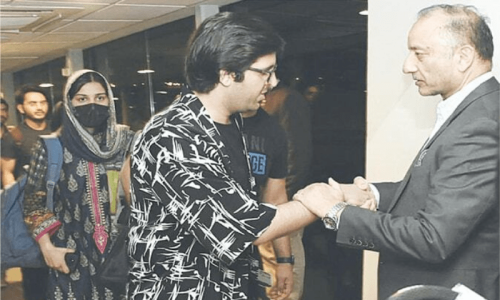ISLAMABAD, Sept 18: President Pervez Musharraf seemed to have given a political response to a legal challenge to his power when he promised to the Supreme Court on Tuesday to give up as army chief if he were elected for another term, in a move that could arouse more frowns than smiles.Political and legal sources said the move, during the court’s hearing of petitions challenging the legality of the president’s dual offices, could throw up more dust in a raging controversy even outside the courtroom and hardly block more legal challenges when he formally becomes a candidate for election to the office he is holding for more than seven years.
What government spokesmen depicted as a major initiative towards a transition to full democracy was seen by opposition sources as a veiled threat for political purposes rather than making any difference to the existing legal position.
Some of these sources saw the move as possibly promising even less than what General Musharraf was legally bound to do under the Constitution and a controversial parliamentary act that allowed him to hold the two offices until the end of his present presidential term, by making his election for what the government regards as his “second term” and opposition lawyers call the “third term” as a condition for becoming a civilian.
Probably that was the reason why there was little stir in the courtroom when main presidential lawyer Syed Sharifuddin Pirzada told a nine-judge bench of the Supreme Court in a prepared statement that “if elected for the second term as the president, General Pervez shall relinquish charge of the office of the Chief of the Army Staff soon after the election but before taking the oath ... for the next term”.
Another aim of the move could be the Commonwealth, which wants General Musharraf to quit one of his two offices before the presidential vote due by Oct 15 and whose secretary-general, Don McKinnon, is due in Islamabad on Wednesday for talks before a ministerial action group of the organisation meets in New York later this month to review Pakistan’s membership because of its military leadership.
The controversial 17th Amendment to the Constitution had initially exempted General Musharraf from the disqualification for the office of president for holding “an office of profit in the service of Pakistan” until Dec 31, 2004 — the date by which he had promised to quit as army chief in a deal with the Muttahida Majlis-i-Amal (MMA) in exchange for the opposition alliance’s support to the amendment.
A later change of his mind was given a legal cover by the President to Hold Another Office Act, 2004, that allowed the president to hold the office of the Chief of the Army Staff for a longer period, but the exemption was made valid only for “the present holder of the office of president” — a key clause to be contested before the Supreme Court and which opposition lawyers say binds the president to give up his army uniform at the expiration of his present term on Nov 15.
If that were true — meaning that General Musharraf would file his papers like any other candidate rather than continuing as “the present holder of the office of the president” for an indefinite period, as seems the government view — Mr Pirzada’s statement before the Supreme Court would only be a reiteration of what was already provided by law and often stated even by government functionaries.
Although the present petitions before the Supreme Court mainly challenge the president’s dual offices as well as his future candidature, political sources said more petitions would be filed once his nomination papers are accepted by the Election Commission, which has already raised a legal controversy by making some changes in electoral rules that support exemptions from disqualifications claimed by the presidential camp.
Those petitions from political parties and lawyers, according to these sources, could also go for the Election Commission and focus on other constitutional disqualifications such as a bar on serving government servants from contesting for parliament or presidency and for at least two years before retirement.
The court battles would be in addition to a threatened agitation by the legal community.














































Dear visitor, the comments section is undergoing an overhaul and will return soon.